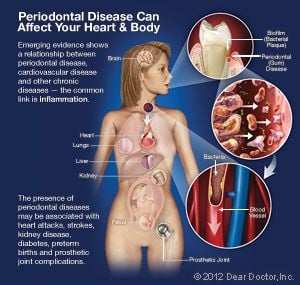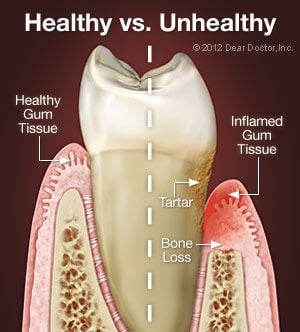Preventive Strategies
The best way to prevent periodontal disease is to brush and floss your teeth effectively every day. Regular dental checkups and professional cleanings every 3 or 4 or 6 months are also an important part of maintaining periodontal health; the instruments and techniques used in these cleanings can reach into areas that your toothbrush and floss can't.
It is also possible to detect early forms of gum disease by evaluating your gingival (gum) tissues, both visually and by examining their attachment levels to the teeth. And the health of your tooth-supporting bone can be assessed by taking dental radiographs (x-rays pictures).
There are other steps you can take: Eating right, reducing stress in your life, and giving up unhealthy habits like smoking will also help ensure that you keep your teeth for a lifetime.
Dr. Clark and our team look forward to helping you instigate and follow-through on a great oral hygiene plan. There are many wonderful things you can do to ensure your smile stays healthy and strong. If you have any concerns about your oral health care routine let us know. We want to help you be the best you that you can be!
5 Steps to a Flawless Floss
We know we should floss at least once a day, but not everyone knows the right way to do it. Use this step-by-step guide to find out how to properly floss your teeth:
 |
Break off about 18 inches of floss and wind most of it around one of your middle fingers. Wind the remaining floss around the same finger of the opposite hand. This finger will take up the floss as it becomes dirty. |
 |
Hold the floss tightly between your thumbs and forefingers. |
 |
Guide the floss between your teeth using a gentle rubbing motion. Never snap the floss into the gums. |
 |
When the floss reaches the gum line, curve it into a C shape against one tooth. Gently slide it into the space between the gum and the tooth. |
 |
Hold the floss tightly against the tooth. Gently rub the side of the tooth, moving the floss away from the gum with up and down motions. Repeat this method on the rest of your teeth. Don’t forget the back side of your last tooth. |
Once you’re finished, throw the floss away. A used piece of floss won’t be as effective and could leave bacteria behind in your mouth.
Talk to your dentist about what types of oral care products will be most effective for you. Look for products that contain the ADA Seal of Acceptance so you know they have been evaluated for safety and effectiveness.









